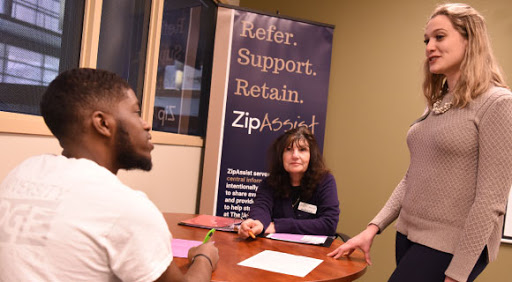SEFA Grant Helps UA Students with Non-Academic Financial Needs

(Image via The University of Akron)
Sarah Hamilton helping a student at ZipAssist.
December 5, 2018
Sarah Hamilton, assistant director of ZipAssist, describes a student from The University of Akron who was suddenly kicked out of her home in October when she began having trouble academically since she was focused on finding a new place to live for her and her son.
When ZipAssist received the referral for this student, Hamilton worked with her for over three weeks to help her find an apartment and pay her first month’s rent through Student Financial Emergency Assistance.
SEFA, the grant that helped the anonymous student, was awarded to UA by the Great Lakes Higher Education Corporation & Affiliates for a student emergency-aid program, an article from the University Communications and Marketing website said.
The goal of SEFA is to keep students in school despite their financial hardships, ZipAssist Director Alison Doehring said.
In hopes of helping low-income students in financial emergencies, this grant allows eligible students to receive up to $1,000 for non-tuition related expenses.
Low-income is defined as an Expected Family Contribution (EFC) of $7,000 or less. Students must also have a cumulative GPA of 2.0 and be in “good standing” with the University to receive the grant.
UA defines a financial emergency as “an unforeseen expense that, if not resolved quickly, could lead to the student’s departure from college and loss of momentum toward completion.”
Some of the expenses covered by the SEFA grant are food or meals, childcare, rent or utilities, gas or car expenses and medical or dental expenses.
Books and tuition expenses are not covered by the SEFA grant.
Students that are able to receive the grant not only receive financial assistance but are provided other approaches to help their situation through the ZipAssist office.
“We try to really provide this holistic approach and conversation with them,” Doehring said.
The staff at ZipAssist provide students with budgeting exercises and access to support on campus, Doehring said. They also help with academics and make sure students are in contact with their adviser and are on track on their studies.
Since UA received the SEFA grant, over 300 students have received assistance through it, Doehring said.
However, there is a deadline of June 2019 for the money that is allocated for the SEFA grant to be used, Doehring said.
After June 2019, “any money that is not used by our campus does go back to Great Lakes and their philanthropic office to be able to be allocated out in their next wave of administering out Great Lakes grants,” Doehring said.
If students are in need or know someone in need, they can fill out a referral. Doehring said that she does not want ZipAssist to be the last resort for students in need.
“We want to be able to be known as an office that is here to support students and that the grant is a great offer that we can provide to many of them,” Doehring said.
Along with the SEFA grant, ZipAssist provides many other services such as off-campus student services and registration initiatives.
If the ZipAssist office can’t directly help a student, they also work with the Salvation Army, Ohio Benefit Bank and United Way to help students in need.
“It’s pretty incredible to get to know students on such a deeper level when they allow us to do so and that’s where we really want to help them feel comfortable,” Doehring said. “You have your advisor, you have your faculty, but you also have to have us and we can help link you to a host of other things in the community or just here on campus,” she said.












Network Support Dallas • Dec 5, 2018 at 8:05 AM
Wonderful website. A lot of useful info here. I am sending it to a few friends ans also sharing in delicious. And obviously, thanks for your sweat!